Welcome to Co-operative Education at Saskatchewan Polytechnic. Co-operative Education is an educational strategy which integrates classroom study with related paid work terms. It is a proven, realistic, and practical system of career education. This system relates theory to practice and brings more meaning to students’ studies, helps orient students to their chosen field, enables them to “earn while they learn” and results in a well-developed career plan before graduation.
This handbook explains how the Co-operative Education Program works and what is expected of the student. Please read it carefully and bookmark this page for future reference.
2.0 Mission statement
Saskatchewan Polytechnic, also Sask Polytech, subscribes to the belief that the quality of education for Co-operative Education students is enhanced by a suitable blend of theoretical learning and relevant, paid, on-the-job experience. Sask Polytech contends that the Co-operative Education Program has the potential to improve the employability of graduates in three ways:
- Competitiveness in recruitment
- Students with a Co-operative Education diploma from a recognized institution can compete successfully with other students as well as with experienced applicants already in the labour force.
- Retention
- Students with Co-operative Education experience become familiar with occupational and workplace requirements of the job.
- Relationship between Sask Polytech and employers
- There is a close relationship between Sask Polytech and employers as a direct result of Sask Polytech Co-operative Education programs. This relationship is a result of frequent visits by Co-operative Education faculty to the work place, observed performance of Co-operative Education students during work placements and regular employer visits to Sask Polytech Co-operative Education department.
3.0 Co-operative Education guidelines
The current Co-operative Education Program operates under the definition, guidelines, and code of ethics of the policy guidelines from the 2014 SIAST (former institution name) Co-operative Education Program Review. As a general principle, Sask Polytech strives to maintain CEWIL Canada affiliation and/or accreditation (CEWIL is Co-operative Education and Work Integrated Learning).
Co-operative Education Recruiting Ethics
(Adapted from CEWIL’s Ethics for the Recruitment of Students at Post-Secondary Co-operative Institutions)
The successful recruitment of co-operative education students depends upon the collective activities of three parties – the interested employer, the co-op student, and the associated educational institution. All participants must adhere to Provincial and Federal legislation in their recruitment and employment practices. However, the Co-operative Education and Work Integrated Learning Canada supports additional guidelines concerning recruiting ethics that support the development of a mutually beneficial and fair process for all concerned.
Employer Ethics
- Provide accurate job posting information including salary and location.
- Provide reasonable notice of candidates to be interviewed and of interview
cancellations. - Respect an institution’s schedule regarding job postings, interview arrangements,
job
offers, etc., and heed the co-operative education policies and procedures of an
institution. - Not discuss job offers or rankings with candidates before, during, or following an
interview - Not seek a candidate’s assessment of another candidate
- Not make multiple job rankings or offers unless prepared to accept multiple candidates
- Honour all matches, and not rescind offers of employment
- Confirm all job offers in writing
- Not translate a co-op assignment into a full-time position encouraging a student to settle for less education
Student Ethics
- Abide by the co-op policies of their institution
- Ensure that employers have accurate information regarding their qualifications
- Notify the co-op office, well in advance, if interviews must be rescheduled or cancelled
- Not discuss or mislead employers about their ranking or job acceptance intentions, and not provide information to employers about other students or employers
- Honour their acceptance of employment as a contractual agreement with the employer
Institution’s Ethics
- Inform students, employers, and other interested parties of institutional policies
and
procedures - Provide equal services to all students and employers
- Accommodate employers’ reasonable requests for job postings, interview space, and
presentation facilities - Provide students with accurate information an all recruiting employers
- Notify the employer of any hiring limitations prior to them conducting interviews
- Notify employers of any students who, after being hired, are not academically eligible
to
continue in their program
Co-operative Education programs will be administered in accordance with the following criteria:
As approved by Sask Polytech using the CEWIL guidelines:
- Each work term is developed in partnership with the employer and approved by the Co-operative Education program as a suitable learning environment;
- The student is engaged in productive work for which the student receives remuneration;
- The Co-operative Education curriculum supports student learning goals, personal evaluation and reflection;
- The student's performance in the workplace is supervised and evaluated by the student's employer;
- The student's progress during their work term is monitored by the Co-operative Education program;
- Both work and academic terms are full-time and follow a formalized sequence. The total amount of Co-operative Education work experience is typically at least 30% of the time spent in academic study. For programs of two years or less, the total amount may be a minimum of 25%.
- A typical work term is full-time work for four months. Exceptions may be made with approval from the program head.
- Co-operative Education work terms begin and end on an academic term;
- The student completing multiple work terms is normally exposed to the work environment during more than one season of the year.
4.0 Co-operative Education at Sask Polytech
Co-operative Education began at the Saskatchewan Technical Institute (now called Saskatchewan Polytechnic) in 1984.
4.1 Modes of participation in mandatory Co-operative Education
A mandatory Co-operative Education program is one in which all students are registered as Co-operative Education students. Each work term all students must pay a Co-op tuition fee as established by Sask Polytech prior to the work term. All students are expected to participate in and pay for all work terms for which they are eligible. These work terms are expected to be program related experiences.
- Students must complete the required number of work terms to graduate with a Co-operative Education designation on their diploma.
- A student may be offered the option for an Alternative Work Term (refer to section 4.5.4).
- In ‘exceptional circumstances’ students can graduate with a “Non Co-operative Education” designated diploma.
4.2 Co-operative Education tuition fee
Students are required to pay a tuition fee for all work terms for which they are eligible. Tuition fees are established by SaskPolytech and are subject to change. The tuition fees are administered and collected by Enrolment Services. The Co-operative Education department has no role in setting or collection of fees. The Co-operative Education fee contributes a portion of the costs of administration, programming and services incurred by the educational institution. It is payable by all students registered in programs who have their work experience administered by the Sask Polytech Co-op department. These costs relate to providing counseling, employment preparation, work term job site visits, and program promotion expenses. This fee is determined annually and does not guarantee employment, as it is not a placement fee. The fee is paid in each academic term prior to the work term.
Please refer to the Tuition and Fees procedures (pdf) for latest information regarding Co-operative Education tuition fees.
4.3 Credit for previous work experience and prior work experience assessment (PWEA)
4.3.1 Student Eligibility
Students may apply for Co-operative Education credit by virtue of any prior relevant work experience.
The work experience must be approved as relevant by both the program head of the student’s academic program and the program head of Co-operative Education. There is a fee to conduct a Prior Work Experience Assessment (PWEA). The PWEA fee is equivalent to fees paid for a Co-operative Education Work Term credit.
Students must submit a completed PWEA form to the Co-operative Education department which outlines the following:
- the name, contact and address of the company
- dates of employment
- detailed job description
- salary

Assessment of the relevance and suitability of prior work experience will be based upon the skills and abilities charts in the Co-operative Education brochure for the student’s academic program and the learning outcomes for the co-op work term.
4.3.2 General Criteria
- Only one four-month work term can be credited for prior work experience.
- The Co-operative Education department recommends that students complete at least one Co-op work term before applying for PWEA.
- Prior work experience must be recent and relevant.
- Application for a Co-operative Education work term credit greater than four months must be submitted to the Dean of Co-operative Education for approval.
- Some discretion in the application of these criteria will be given to the Co-operative Education department.
- Final authorization in granting work term credit will rest with the Co-operative Education program head and the Academic program head.
4.4 Work term sequencing
Sask Polytech has approved the following guidelines for work term time patterns:
- There must always be at least two academic terms prior to the first work term.
- No work terms shall be scheduled for students who have otherwise completed the academic requirements of their diploma unless a specific exception is approved by the dean.
Business programs
|
Program |
Fall Sept - Dec |
Winter Jan - Apr |
Summer May - Aug |
Fall Sept - Dec |
Winter Jan - Apr |
Summer May - Aug |
Fall Sept - Dec |
Winter |
|---|---|---|---|---|---|---|---|---|
| Business Accountancy | Academic Term 1 | Academic Term 2 | Work Term 1 | Academic Term 3 | Work Term 2 | Work Term 3 | Academic Term 4 | |
| Business Insurance | Academic Term 1 | Academic Term 2 | Academic Term 3 | Work Term | Work Term (cont.) | Work Term (cont.) | Academic Term 4 | |
| Business Human Resources | Academic Term 1 | Academic Term 2 | No Work Term | Academic Term 3 | Work Term 1 | Work Term 2 | Work Term 3 | Academic Term 4 |
| Business Management | Academic Term 1 | Academic Term 2 | No Work Term | Academic Term 3 | Work Term 1 | Work Term 2 | Work Term 3 | Academic Term 4 |
| Business Marketing | Academic Term 1 | Academic Term 2 | No Work Term | Academic Term 3 | Work Term 1 | Work Term 2 | Work Term 3 | Academic Term 4 |
| Business Information Systems | Academic Term 1 | Academic Term 2 | Work Term May - Oct |
Academic Term 3 Nov - Feb |
Academic Term 4 Mar - June |
Technology programs
|
Program |
Fall Sept - Dec |
Winter Jan - Apr |
Summer May - Aug |
Fall Sept - Dec |
Winter Jan - Apr |
Summer May - Aug |
Fall Sept - Dec |
Winter |
|---|---|---|---|---|---|---|---|---|
| Agriculture and Food Production | Academic Term 1 | Academic Term 2 | Work Term 1 | Academic Term 3 | Academic Term 4 | Work Term 2 | Work Term 3 | Academic Term 5 |
| Architectural Technologies | Academic Term 1 | Academic Term 2 | Work Term 1 | Academic Term 3 | Work Term 2 | Academic Term 4 May - July |
Work Term 3 | Academic Term 5 |
| Civil Engineering Technologies (civil construction and water resources) | Academic Term 1 | Academic Term 2 | Work Term 1 | Work Term 2 | Academic Term 3 | Academic Term 4 May - July |
Academic Term 5 | |
| Computer Engineering | Academic Term 1 | Academic Term 2 | Work Term 1 | Academic Term 3 | Work Term 2 | Academic Term 4 May - July |
Work Term 3 | Academic Term 5 |
| Electrical Engineering | Academic Term 1 | Academic Term 2 | Work Term 1 | Academic Term 3 | Work Term 2 | Academic Term 4 May - July |
Work Term 3 | Academic Term 5 |
| Engineering Design & Drafting | Academic Term 1 | Academic Term 2 | Work Term 1 | Academic Term 3 | Work Term 2 | Academic Term 4 May - July |
Work Term 3 | Academic Term 5 |
| Environmental Engineering | Academic Term 1 | Academic Term 2 | Work Term 1 | Work Term 2 | Academic Term 3 | Work Term 3 | Academic Term 4 | Academic Term 5 |
| Instrumentation Engineering | Academic Term 1 | Academic Term 2 | Work Term 1 | Academic Term 3 | Work Term 2 | Academic Term 4 May - July |
Work Term 3 | Academic Term 5 |
Degree programs
|
Program |
Fall Sept - Dec |
Winter Jan - Apr |
Summer May - Aug |
Fall Sept - Dec |
Winter Jan - Apr |
Summer May - Aug |
Fall Sept - Dec |
Winter |
|---|---|---|---|---|---|---|---|---|
| Bachelor of Construction Management | Academic Term 1 | Academic Term 2 | Work Term | Academic Term 3 | Academic Term 4 |
4.5 Recognition of work terms and Co-operative Education diploma graduation requirements
Credit is awarded for successful completion of each approved work term, as per regulations published in this handbook. Should a student generate his/her own work term opportunity, approval must be obtained from the appropriate coordinator in order for it to be eligible for work term credit. Each successful work term is recognized on the student’s academic record as a “Pass”. Sask Polytech officially recognizes successful completion of Co-operative Education and graduation requirements by issuing a transcript and diploma with the Co-operative Education designation.
Exceptional Circumstances:
- The intent of Co-operative Education is that students enrolled in the program will successfully complete ALL work terms.
- In exceptional circumstances, when situations beyond their control prevent students from obtaining suitable employment for the full complement of work terms, they may still be eligible to graduate with a Co-operative Education designation diploma.
- To achieve this, a student must obtain approval from the Co-operative Education program head and fulfill a minimum of two successful 16 week work terms and/or a minimum of 8 weeks (50%) per four-month work term.
- NOTE: For students enrolled in COOP 150 (as in the Business Information Systems program), students will need to complete a minimum 50% of the COOP 150 term, which is equivalent to 12 weeks total.
- For students who are only able to obtain credit for one work term and are enrolled in a program where Co-operative Education is a mandatory component of the program, permission from the dean and/or academic chair of Co-operative Education is required for the student to graduate with a non Co-operative Education designated diploma.
4.5.1 Assessment of Work Term Credit
Co-operative Education students will receive one of the following marks for each work term:
P - Course requirements successfully completed (Pass/Fail Only)
W - Withdrawal without academic penalty
NT - Not Taken
F - Failed course requirements, no percentage provided
EX - Exempt from course requirement
P* - Work Term Alternative Credit Pass
4.5.2 Performance Objectives for a Work Term
Students must satisfy the following criteria to receive credit for a successful work term:
- Students will participate in and attend mandatory scheduled Co-operative Education meetings and interviews.
- Students must complete all required documents and submit a current resume to their Co-operative Education coordinator prior to all work terms.
- Each work situation is developed and/or approved by a Sask Polytech representative and/or a Co-operative Education coordinator, as a suitable learning situation. Students who generate their own work term opportunity must obtain approval from their coordinator prior to accepting the position in order to be eligible to receive credit for the work term.
- Students must attend all of their scheduled interviews.
- Students are to be engaged in productive work (rather than merely observing) in a full -time capacity. However, circumstances may prevent full-time work and minimum 20 hours per week for 16 weeks per 4-month term will be considered for credit.
- Students should receive remuneration for the work performed.
- Student’s progress in the work placement will be supervised and evaluated by the student’s employer.
- Student’s progress in the work placement will be monitored by the Co-operative Education Department.
- Upon completion of the work term, students are expected to schedule a meeting with their Co-operative Education coordinator to discuss the experience of the work term, their plans for future work terms, and academic progression and career goals.
4.5.3 Failure to Obtain Work Term Credit
In the event that a student does not obtain a work term job which is related to their course of study, or if the student is not granted credit for a work term, they will be required to discuss the situation with their Co-operative Education coordinator. The student may be required to perform an Alternative Work Term (see 4.5.4). A student can only receive a maximum of one credit through an Alternative Work Term in their program.
Special arrangements may be made for a student to obtain the necessary work term credits in order to become eligible to receive a diploma with a Co-operative Education designation.
A student who has successfully completed all academic requirements, but has not met the Co-operative Education requirements, may be eligible to receive a diploma without a Co-operative Education designation. This is contingent on the student being an “active” participant in the Co-operative Education program.
4.5.4 Alternative Work Term Credit
1. Background/Intent:
The Alternative Work Term credit is not intended to replace a student’s full participation in the required number of Co-operative Education work terms. Rather, these alternatives are designed for students who have actively participated in the Co-operative Education placement process, but have not successfully secured a work term due to exceptional circumstances. These alternative measures are not available for students who wish to opt out of the regular work term guidelines.
- These alternatives will be used to allow a student to graduate with a Co-operative Education designation on the diploma.
- The creation of these alternatives is largely in response to students in mandatory Co-operative Education diplomas having difficulties completing the required number of work terms. As well, particularly for international students, Study/Work Permit issues arise if students are not placed on work terms, so it’s important to have a defined strategy in place as an alternative.
- These alternatives have been developed to address mandatory Co-operative Education diploma programs, and particularly, address international students study/work permit requirements. These alternatives provide an alternative path to successful completion of their program.
- These provisions also do not negate, for those diplomas where the work term time pattern has three, 4-month work terms, the ability to grant the Co-op Ed diploma with two of the three work terms successfully completed.
- The alternative work term chosen for a student will be determined by the applicable Co-operative Education coordinator and student, in consultation with the Co operative Education program head.
2. Possible alternatives:
Please note that each of options “b”, “c”, or “d” is contingent upon the student fulfilling requirement “a”.
- Mandatory Requirement – Non-Training Related Paid Work:
- The student will find paid, non-training related, Canadian employment (with no further
job search assistance from the Co-op Ed office, beyond what has already been provided
in the semester preceding the start of the work term) that is at least 50% of full
time for the duration of the work term or for the allowed amount of time (see below
in “b” for further explanation). This non-training related work must be vetted/approved
by the Co-op office as legitimate “world of work” experience for the student, meeting
the 50% of full time requirement.
- The student will find paid, non-training related, Canadian employment (with no further
job search assistance from the Co-op Ed office, beyond what has already been provided
in the semester preceding the start of the work term) that is at least 50% of full
time for the duration of the work term or for the allowed amount of time (see below
in “b” for further explanation). This non-training related work must be vetted/approved
by the Co-op office as legitimate “world of work” experience for the student, meeting
the 50% of full time requirement.
- Alternative #1:
- In combination with “a”, the student must complete and submit a research project/paper that involves researching a company in a training related field, interviewing an employee of that company to determine what the company does/what it takes to obtain entry level employment with that company in the student’s chosen field of study, plus any other topics deemed relevant, and a summary of findings from a tour of that company’s offices/work site. The exact nature of the research paper/project would be proposed/evaluated by the student’s academic program area. The Academic Chair will be responsible to assign the development of this project to the academic areas and for ensuring someone is assigned to evaluate the research project/paper in a timely fashion and to report the results to the appropriate Co-operative Education coordinator.
- Since the intention of Co-op Ed is to provide training related experience, this combination of non-training related work/research project can be used to grant only 1 of the required number of work terms or a portion of 1 work term (if the diploma only has a single work term of 6 months as with BIS or only two subsequent 4-month work terms, as in Civil [Construction or Water Resources Specialties]).
- In the programs that include three, 4-month work terms, only 1 work term credit could be granted using an alternative work term.
- In order to comply with CEWIL accreditation within the BIS diploma (which has one 6-month work term), the alternative work term could comprise 2 of the 6 months, but the remaining 4 months must be training related.
- For the Civil Engineering diploma (both Specialties) which has only two, 4- month work terms, the alternate measures could comprise one 4-month time period, but the remaining 4 months are ideally training related.
- When a student achieves one 4-month credit through a combination of Alternative “a”
+ “b”, the student will receive indication of credit granted for the applicable Co
op Ed Course Code, but a special notation on the transcript will indicate the credit
was granted using alternative work term.
- Alternative #2:
- Combined with “a”, a student would complete training related work for a non-profit organization (i.e. short-term project that could be completed in conjunction with the paid, non-training related work outlined in “a”). In this case (and would only be allowed for work with non-profit organizations), the student must be paid at least minimum wage or an honorarium (in order to meet the Co-operative Education department’s affiliation requirement with the Co-operative Education and Work Integrated Learning Canada [CEWIL Canada] that work must be paid, to be considered eligible for work term credit). These opportunities would be largely student generated, with some assistance by the Co-operative Education department. The Co-operative Education department would have the responsibility to conduct a work site visit with the non-profit organization. Exceptions can be made at the discretion of the Co-operative Education Program Head. As well, this work for a non-profit organization must fit into the time requirements, as outlined in “b”.
- In this case, when a student successfully completes Alternative “a” + “c”, the student
would be granted a Co-op Ed credit for the applicable Co-op Ed Course Code, but a
special notation on the transcript will indicate the credit was granted using alternative
measures.
- Alternative #3:
- Combined with “a”, a student would participate in an applied research project, approved by Saskatchewan Polytechnic, devised/monitored/ evaluated by the applicable academic area and would develop the student’s training-related skills. A student’s participation in an applied research project would be approved by the applicable Academic Chair.
- Again, the time requirements must fit as outlined in “b” and the academic area conducting the applied research project would report on the student’s progress to the Co operative Education coordinator (which could include a work site visit by the coordinator).
- If an applied research project has monies available, the student should be paid an honorarium for their participation in the project or a wage, if there are other research assistants involved in the project who are receiving a wage for their work in the applied research. Exceptions can be made at the discretion of the Co operative Education Program Head.
- When a student achieves one 4-month credit through a combination of Alternative “a” + “d”, the student will receive indication of credit granted for the applicable Co op Ed Course Code, but a special notation on the transcript will indicate the credit was granted using an alternative work term.
- Students should refer to the Alternative Work Term for Co-operative Education Students form and review with their Co-operative Education coordinator when choosing an Alternative Work Term.
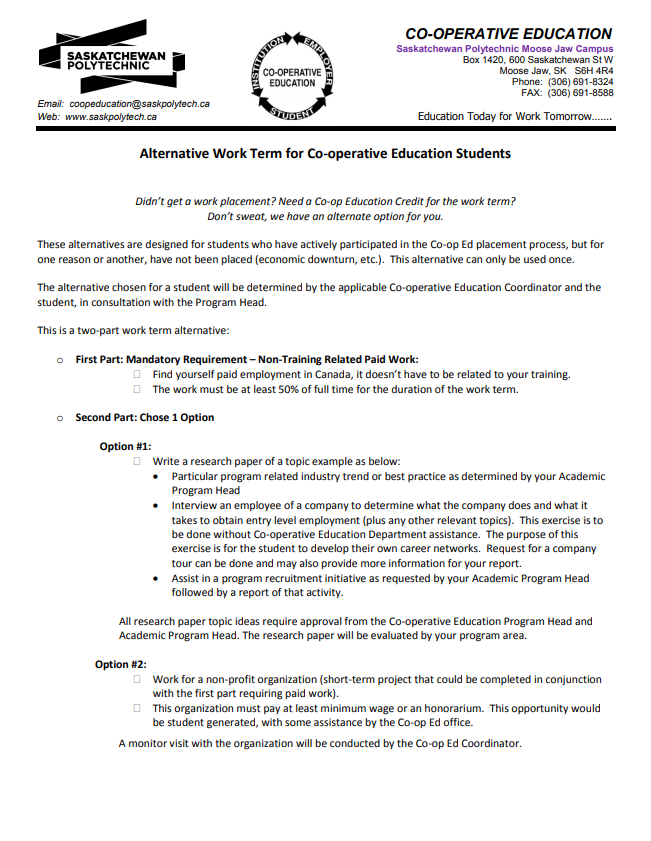
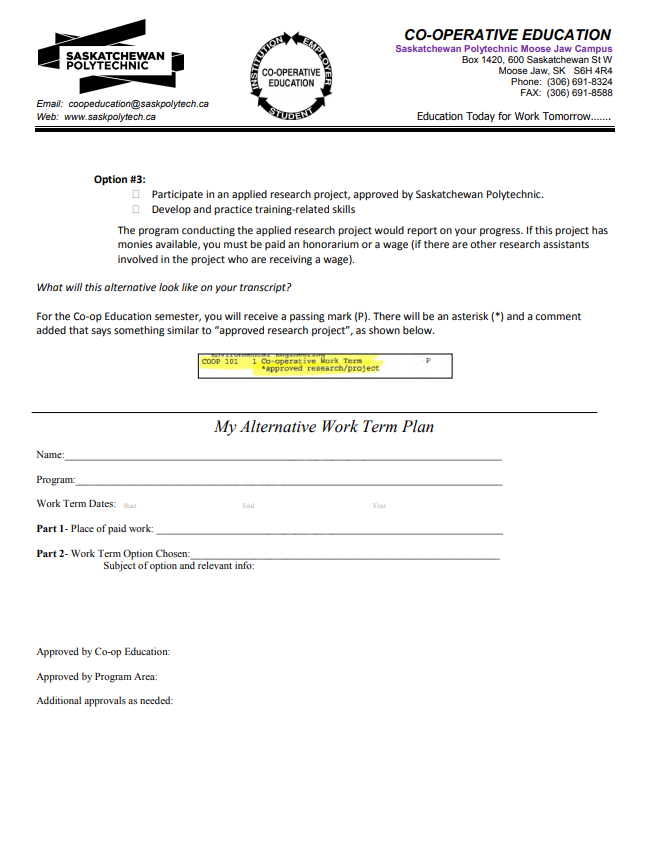
4.6 Student participation in Co-operative Education
4.6.1 Classification of Student Status
1. Active/Inactive Students
The provision of two diploma types, one with and one without the Co-operative Education designation, requires the classification of each student’s participation in the work term process as either “Active” or “Inactive.”
- Student participation is deemed to be Active only if it includes all of the following
activities:
- applying for a minimum of 25% of total applicable posted
opportunities; - accepting an offer, unless the student can provide a valid reason to reject the offer;
- submitting a resume and related documentation as per posted deadline(s);
- attending all work placement interviews;
- submitting an evaluation following each work term placement;
- attending a “Return-to-Campus” meeting following each work term placement, and fulfilling work term obligations.
- attending meetings with their coordinator as requested.
- applying for a minimum of 25% of total applicable posted
- Student participation which fails to meet one or more of the above criteria may be classified as “Inactive.”
2. Fully/Partially Qualified Students
Fully qualified eligibility status shall be provided to a student meeting the following conditions:
- the student must have passed all academic courses in the semester preceding the semester in which application for Co-op is made;
- the student must have enrolled in all courses for the current academic semester by first day of job postings;
- Partially qualified eligibility status shall be provided to any student who fails to meet the above criteria. Students who are on disciplinary probation may also be noted as partially qualified; this decision will be at the discretion of the academic program head.
Partially Qualified requires the identification of such students for internal Sask Polytech Co-operative Education Department purposes. Employers are not notified which students are Partially Qualified. However, employers are alerted to review a student(s) transcript copy(ies) that are provided/required within the job application package.
3. Academic Eligibility
Students enrolled in academic programs where Co operative Education is mandatory, as per 4.6.1 (B), are eligible to apply for all posted positions in their respective programs and participate in all the services offered by the Co-operative Education department.
Students enrolled in academic programs where Co-operative Education is optional, both Fully Qualified and Partially Qualified, are subject to the following:
- All on campus business students are eligible to join Co-operative Education whether they are fully qualified or partially qualified. Business students are ineligible to participate in Co-operative Education if on probation.
- Students must also be accepted into a Sask Polytech on campus program to be eligible as a Co-operative Education student.
4.7 Exemption from mandatory Co-operative Educations Programs
All students enrolled in mandatory Co-operative Education programs are expected to participate in the Co-operative Education component of their program unless a specific application for exclusion from Co-op is made.
A student may qualify for a diploma without a Co-operative Education designation, if deemed eligible for exemption from the Co-operative Education Program:
- a request for exemption must be submitted to the program head of Co-operative Education,
- if granted, the exemption results in the refund of any fees previously paid for Co operative Education, and exempts the student from participation in the Co-operative education program while registered in the specific academic program.
5.0 The hiring process
5.1 Services provided by the Co-op Education department
- Student orientation and employment preparation sessions.
- Personal resume, cover letter and interview counseling.
- Assisting students to effectively market themselves.
- Marketing Co-operative Education programs to related industries through mail, e-mail, telephone and personal visits to employers.
- Facilitating the student application and selection process. This includes advertising job openings, forwarding applications and arranging interviews upon employer requests.
- Work term monitoring – either on site, telephone or video conferencing.
- Guidance, performance evaluation and career planning individually with students.
- Maintaining student and employer files.
- Providing telephones and video conferencing access for student use for long distance job recruitment within Canada.
- Mediating between employers and Co-operative Education students when necessary.
- Providing employer feedback to academic programs on the content and direction of academic programs and employer needs.
- Developing promotional materials.
- Participating in career trade shows and external professional organizations aligned with specific programs.
- Provide on-going assessment of Co-operative Education activities at college, community, provincial and national levels (CEWIL Canada).
- Providing a work term environment that reinforces classroom theory with “hands-on” practice.
- Aiding in the recruitment of applicants to Saskatchewan Polytechnic.
5.2 Role of the Co-operative Education Co-ordinator
5.3 The job search
To be successful in obtaining a Co-operative Education job, both the student and the Co-operative Education staff must contribute to the job search.
Many jobs are generated through the Co-operative Education Department, but the ultimate responsibility for securing a Co-op job lies with the student.
Some Co-operative Education students find their own jobs through their own contacts. If students do this, they must to inform their coordinator before accepting a self-generated job. The coordinator must approve jobs before the job can be considered an official Co-op work term. The coordinator may be able to assist students in this process.
The coordinator cannot make the employer choose a student. The coordinator remains objective and does not influence employers’ decisions. Remember, the employer is looking for evidence of positive energy, attitude, enthusiasm, interest and initiative. These are some of the attributes students need to demonstrate to get and hold their jobs. The coordinator can help with interview techniques, but it is the student who must secure the job during the interview.
5.4 Mobility
A willingness to relocate will ensure greater probability to obtain a job opportunity. Students who limit themselves to a particular location may be limiting their opportunities for work experience.
Co-op coordinators will work diligently to present as many job opportunities as possible. Students placing geographic restrictions in their work term must be prepared to actively assist the coordinator by pursuing any contacts/job opportunities in the desired location.
5.5 Orbis
5.6 Job posting
The Co-operative Education department will post a number of suitable job opportunities for each program of study. Co-op students may apply for any of the jobs posted by the Co-operative Education department through their Orbis website accounts.
Procedures to Apply for a Co-operative Education Job:
It is the student’s responsibility to:
- regularly check their Orbis account for information on employment opportunities
- submit a portfolio before the deadline (Other documentation such as samples of your work may be required – watch for details on the job posting.)
- sign up for an interview time (on Orbis) when notified
Each student should consider a job posting carefully before submitting his/her portfolio in the competition.
Once students have applied for a job, it is expected that they will commit themselves to that job if is offered to them.
Under no circumstances will a student directly contact an employer without the authorization of Co-operative Education coordinator. Your Co-operative Education coordinator deals with employers on your behalf providing a process that makes it easy for them to recruit at Sask Polytech. Intervention by students directly jeopardizes not only the current position, but all future positions and the relationship that has been established by your Co-operative Education coordinator.
5.7Job interviews
Interviews for posted positions are arranged by the Co-op Education department. An employer’s intention to interview notice will be emailed to the student. Students are then required to select one of the interview times available. It is critically important for students to check their SaskPolytech email accounts frequently.
Students are expected to attend all interviews to which they are invited. If it is not possible to attend an interview, students must inform their coordinator immediately, to allow for alternative arrangements. Failure to attend an interview or to inform the Co-operative Education coordinator in advance may result in withdrawal of further assistance from the Co-operative Education department.
Employers are asked to complete an Interview Skills Assessment Form for each Co-op student they interview. Co-operative Education coordinators use the completed form to provide feedback when counselling the respective student about interview techniques. A copy of the assessment is kept in the student’s file.
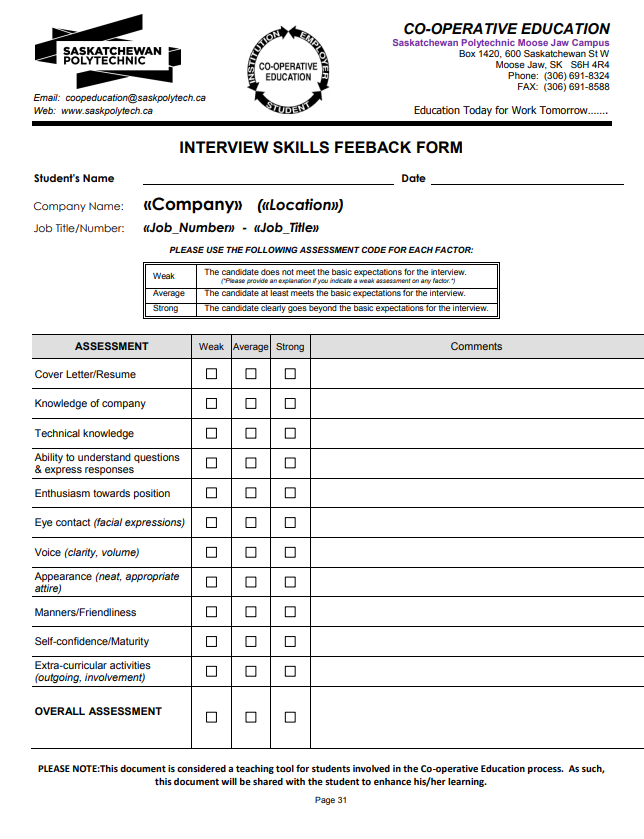
5.8 Orbis match placement process
Your coordinator will present an in classroom presentation prior to the time when rankings are released to students. Placements during the “match process” are conducted through an Orbis website algorithm.
Assigning a rank to an employer’s rank implies that the student will make a firm commitment to the employer, regardless of match results. If a student does not want to be matched with any employer, then the student must not assign a rank to the employer.
Upon a work term match, the student is expected to fulfill work term requirements as stated by the employer and abide by the Saskatchewan Polytechnic Student Code of Conduct at all times.
5.9 Accepting/rejecting an offer post match placement process
5.9.1 Accepting
Job offers must be accepted or rejected within one (1) working day (24 hours) or as approved by the Co-operative Education coordinator.
In accepting a work placement offer, the student makes a firm commitment to the employer, regardless of subsequent offers. The student is expected to fulfill work term requirements as stated by the employer and abide by the Saskatchewan Polytechnic Student Code of Conduct at all times.
The process is designed to maintain the integrity of the Co-operative Education placement process and the program’s relationship with employers. The student is required to honor the terms of his/her employment as part of his/her responsibilities as a student enrolled in a Saskatchewan Polytechnic Co operative Education program. An accepted work placement offer is a contract between the employer and the student, which is expected to be honoured by both parties.
5.9.2 Rejecting a Job Offer Post Match Placement Process
At times student may find a job offer undesirable; however, the following
points should be considered:
-
Consider each job posting carefully before submitting a resume to the competition. Once students have applied for a job, it is assumed they will commit themselves to it, if offered the position.
-
Job descriptions, salaries, and locations of Co-op positions are generally included in the Co-op job posting. Rejecting a job offer should not normally occur. By applying for a job, students are indicating they would accept it, if it is offered to them. However, if students find during the interview that the job is not what they anticipated (e.g., job description, location, salary are different than posted), they would not be expected to accept the position. If a student is no longer interested in the position, they should inform their coordinator so that he/she can notify the employer immediately.
-
Rejection of a job offer for no valid reason may result in the student being placed in the “inactive student” category.
-
Once students have been offered and have accepted an employment opportunity generated by the Co-operative Education department, they are ineligible to apply for other job postings or attend other interviews.
-
Playing off one employer against another with the hope of finding a better position at a future date demonstrates poor judgment. It would cause the employers to question the responsibility and maturity of Sask Polytech students and potentially jeopardize future opportunities with that employer. The integrity of the Saskatchewan Polytechnic Co-operative Education department must be maintained at all times.
5.9.3 Failure to Honour an Employment Commitment
Possible Penalties
-
The student will be placed on probation by the academic program head, with terms established following consultation with the Co-operative Education program head.
-
The student will be denied the services of the Co-operative Education program for the current work term.
-
The student will not receive a work term credit for the current work term. Failure will be assigned for the work term credit.
-
A letter, sent by the Co-operative Education program to the respective employer(s), will detail Co-operative Education policies and procedures and will provide notice that the student is subject to penalties for failing to meet his/her work term commitments.
Procedure
-
A student who indicates an intention to not fulfill the conditions of a work placement shall immediately be provided, by the Co-operative Education program, with a copy of the policy.
-
Within three (3) working days of procedure #1, the student shall provide the Co-operative Education program a written submission for exception from the terms of the policy.
-
Within three (3) working days of procedure #2, the Co-operative Education program shall convene a meeting of the student, the Co-operative Education program head, the academic program head, and the academic dean.
-
Within three (3) working days of procedure #3, the Co-operative Education program shall notify the student in writing of its determination pertaining to the request for exception.
5.9.4 Changes in Student Academic Status
It is the student’s responsibility to disclose to their employer any changes to their academic status. The decision as to whether the student will or will not be employed or continue to be employed is strictly up to the employer. The student’s job will not be taken away from them by the Co-operative Education department.
If a student is required to discontinue from their program, the Co-operative Education department is required to inform a student’s employer. If the employer chooses to retain the student for the work term, the work term will be considered a non-credit work term.
5.10 Working out of the country
5.11 Student generated work term placements
Students requesting approval for jobs generated on their own will be assessed on an individual basis by both the Co-operative Education program head and the relevant academic program head. They are required to submit a Student Generated Job Information Form. Credit is awarded for successful completion of each approved work term.
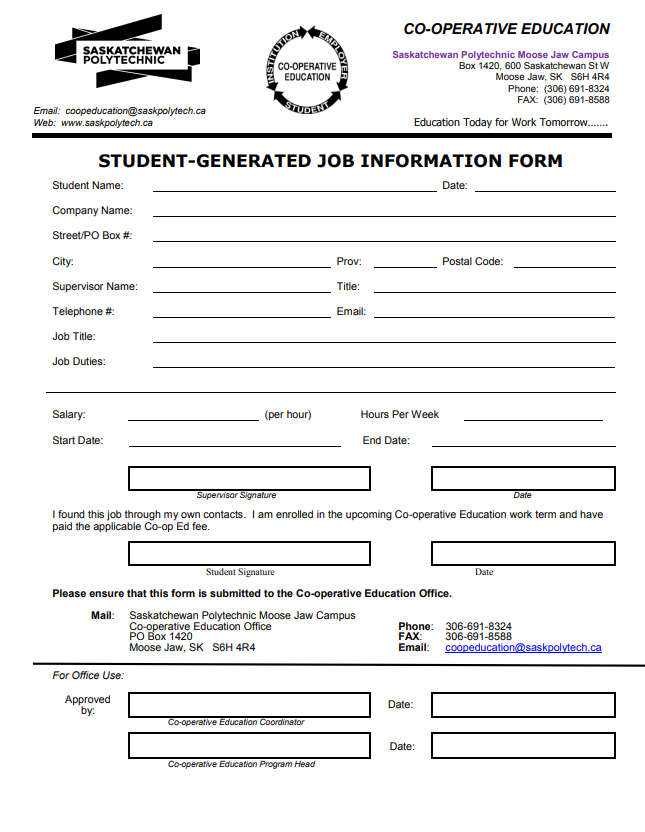
5.12 Self-employment
Students requesting approval for self-employment will be assessed on an individual basis both by the Co-op Department and the relevant academic program. They should be prepared to submit the following documentation to their Co-op coordinator: job description, client list, marketing/business plan, and a progress schedule.
Credit is awarded for successful completion of each approved work term. Should students be self-employed, approval must be obtained from both the Co-operative Education program head and academic program head in order to be eligible for work term credit.
5.13 International students
5.14 Medical restrictions
6.0 The student at work
Students are to remember that while on a work term, they are representing not only themselves but also Sask Polytech. Students will be expected to do their best at all times to promote the program and to set a positive example for the students who will follow them. It is expected that employers will abide by their provincial labour legislation laws.
6.1 Expectations on the job
6.2 Failure to report
6.3 Transportation and accommodation
6.4 Use of computer, network and other information resources
6.5 Out-of-province vehicle insurance/licensing
6.6 Out-of-province health benefits
6.7 Salaries/benefits
6.8 Holidays and time off
6.9 Strikes/layoffs/closures
6.10 Resignation
6.11 Termination
6.12 Employer contracts
6.13 How to handle problems
Because the work term is a “real life” work experience, students are expected to deal with many of their work-related problems themselves. This means that, for the most part, students should try to sort them out with their supervisor.
However, if students are unable to approach their supervisor for any reason, they should contact their Co-operative Education coordinator or the Co operative Education Department immediately.
A student has the right to leave a job site, without resignation if he/she feels that their health, well-being and safety is at risk.
6.14 Monitor visit
During the work term, a coordinator will either visit, phone or video conference the student and the supervisor. This is to monitor the work the student is doing, how he/she is performing, and to determine whether the student is experiencing any problems on the job. The coordinator will complete a monitor report form, which will be placed in the student’s Co operative Education file. Students may request to see this report at any time. Monitor reports may also be viewed by the academic program head.
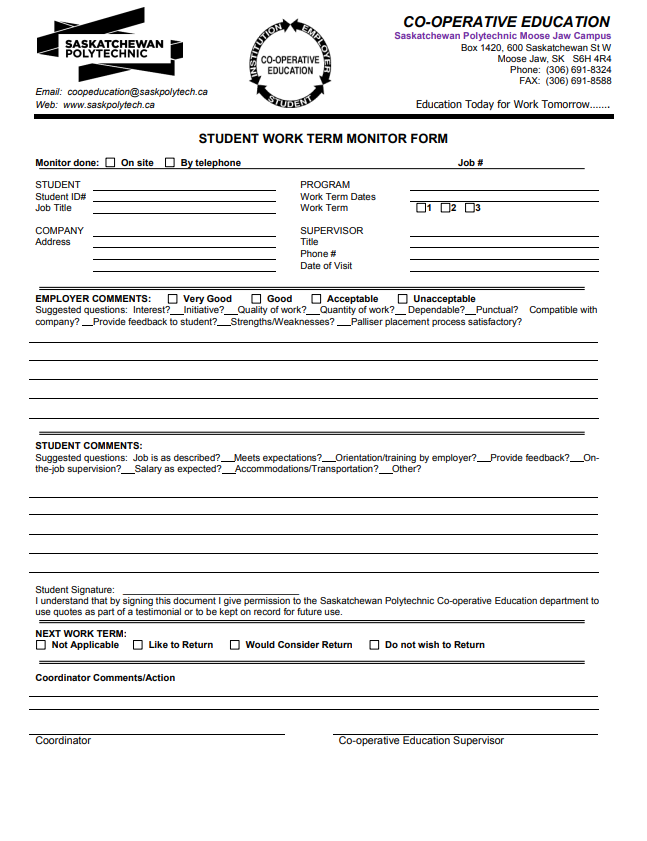
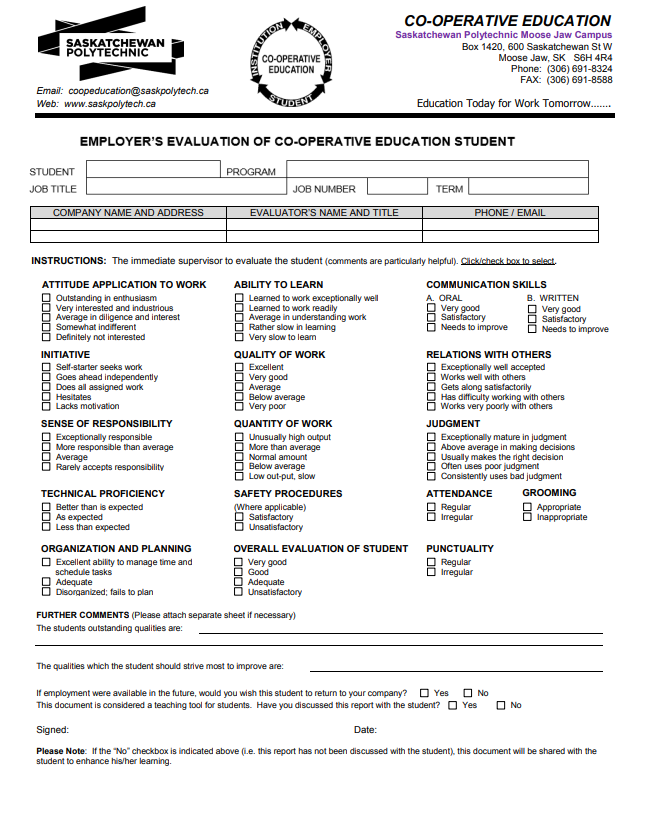
6.15 Employer's evaluation
Near the completion of each work term, employers are asked to complete an evaluation of their student’s performance – the Employer Evaluation Form. The employer is encouraged to discuss the evaluation with the student, or the student may request that their coordinator to review the form with them. This evaluation will be placed in the student’s Co-operative Education file.


7.0 Post work term
7.1 Return-to-campus meeting
7.2 Student's evaluation
Coordinators may ask students to complete a Student Work Term Evaluation Form. This form gives students the opportunity to assess the quality of their work term. This evaluation will be placed in the student’s Co-operative Education file.
8.0 Unplaced students
8.1 Unplaced students
8.2 Placement process for unplaced students
- Each unplaced student will be asked to submit a Placement Authorization Form including
information as acceptable salary, preferred location, addresses & phone numbers where
the student can be reached.
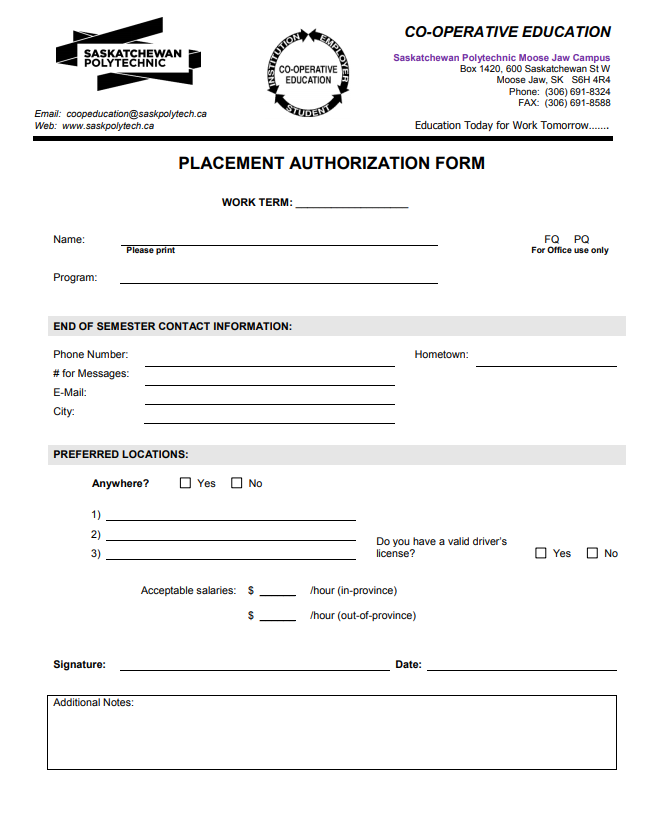
- Students’ resumes will be submitted to employers based on preferred location.
- Placement services will continue to be offered to unemployed students to the point of the work term’s 50% duration has elapsed.
- Students are encouraged to remain in contact with the Co-operative Education coordinator.
- Assignment of an Alternative Work Term may need to be considered. (See 4.5.4)
9.0 Appeals
All appeals will be administered and dealt with through Saskatchewan Polytechnic’s Academic Appeals Process, Policy 1210 (pdf).
10.0 The final result
Upon successful completion of all requirements of the Co-operative Education program, students will be eligible to receive the Co-operative Education designation on their diploma.
11.0 If you do not read anything else, read this
Co-operative Education is an opportunity for students to prove to themselves and their employer they are capable and motivated employees. Students will also be representing Saskatchewan Polytechnic and other students who follow them. The best advertising the Co-operative Education Program has is a satisfied employer who wants another good student like the last one. Therefore, it is the student’s responsibility to:
- maintain regular contact with the Co-operative Education Department and keep informed of current Co-op activities;
- attend all Co-op Education coordinator/student meetings;
- develop a professional resume and cover letter;
- apply for job opportunities and sign up for interviews;
- be on time for meetings, interviews and appointments;
- prepare and research the company prior to interviews;
- accept a job offer and make a commitment to that employer;
- inform the Co-operative Education coordinator any problems or concerns that may arise;
- attend “Return to Campus” meetings as requested.
- While the Co-operative Education program does not guarantee every student a work placement, every reasonable effort is taken to maximize student opportunities.
Co-operative Education results in graduates who are better prepared to enter the work force as productive and valuable employees. Co-operative Education students will have experience, something every employer looks for in a future employee.

